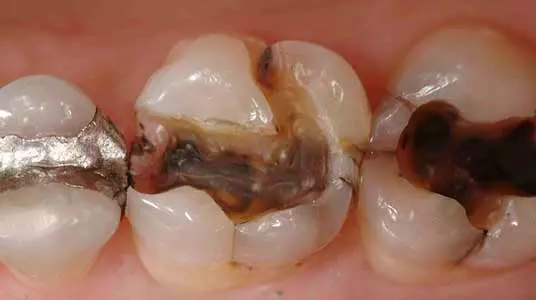Are you having a Cracked tooth?
CRACKED TOOTH SYNDROME
It relates to a variety of symptoms and signs caused by a crack in a tooth. To improve the chances of saving a cracked tooth, early diagnosis and treatment are important. Most cracked teeth can be saved.
Cracked tooth syndrome usually occurs in a molar or premolar but may affect any tooth.
Causes of Cracked Tooth Syndrome
- Large fillings that may weaken the teeth and make them prone to fracture.
- Clenching or grinding of the teeth (bruxism), can cause teeth to crack.
- Chewing on hard foods or substances, such as ice, sweets or pencils.
- Trauma such as a blow to the teeth.
Cracks may start in the top of the tooth and run downwards. These cracks may propagate and involve the pulp, nerve and root.
Symptoms and Signs of a Cracked Tooth
Sharp and erratic pain upon chewing (especially when biting on grainy food) or after release of biting pressure; not all cracks cause pain
Pain or discomfort when the crack is exposed to cold or hot food or liquids
Sensitivity to sweet foods
Difficulty in pinpointing which tooth hurts or whether the pain is coming from a top or bottom tooth
DIAGNOSIS
Diagnosis can be difficult because symptoms are not consistent. Also, cracks vary greatly in length and location. Often, cracks are not discovered until a variety of symptoms are present. If a cracked tooth is suspected, your dentist will take your dental history and ask you questions about the sensitive tooth.
Radiographic exam (X-rays)
The dentist may want to take an X-ray film to rule out other causes of tooth discomfort, such as decay. Cracks in teeth rarely show up on X-ray films. Cracks in the root may show up as a loss of bone around the cracked root or give the appearance of an abscess.
Removal of a filling
If the suspect tooth has a filling, your dentist may remove the filling. This will allow the dentist to determine if a crack is present and, if so, the extent and direction of the crack.
TREATMENT FOR A CRACKED TOOTH:
Early treatment is important. Treatment depends on the extent and position of the crack.
SIMPLE CRACK:
The treatment for most cracked teeth involves removing the weakened cusp and placing a large filling or crown (cap) on the tooth.
If more than one cusp is fractured or if the tooth is heavily restored, a crown is an effective treatment. The crown protects the tooth and often prevents the crack from progressing.
Sometimes, before a crown or filling is placed, a stainless steel band is put in place with a sedative dressing to see if the tooth pain can be stopped. If the discomfort stops, a filling or crown will then be placed. If the discomfort does not stop, the dentist may suggest the need for root canal treatment
COMPLEX CRACK:
If the crack has progressed to the pulp or has caused inflammation of the pulp, root canal treatment may be needed before the crown or filling is put in place. Root canal treatment requires two or three additional appointments.
UNTREATED CRACKED TEETH:
The longer a simple cracked tooth is left untreated, the more likely it will become a complex crack. The pulp inside the tooth may die, and infection in the tooth may occur. It will then be necessary to perform root canal treatment or, in some cases, extract the tooth.
In severe cases, the tooth may split in half. In this case, the tooth usually has to be extracted. A bridge, denture or dental implant may then be needed.
PREVENTION
- If you clench your teeth or grind them together (bruxism), particularly at night time, you can have a special night guard made to protect your teeth. Your dentist can fit you with a night guard, also called an occlusal splint.
- Avoid chewing on hard objects such as ice, hard sweets, pens or pencils.
- Wear a protective mouth guard when playing contact sports.
- Practice good dental hygiene to minimise the need for fillings.
- Even with these precautions, teeth can still develop cracks.
COSTS
Costs vary according to the extent of treatment. Extra costs may apply if complications occur and more treatment is needed. As the treatment and outcome may become different from what was first proposed, the final account may be different from the original estimate. It is best to discuss costs before and during treatment, rather than after.
For any further enquiries contact us at rydedentalfamily.com.au/ or call us on (02) 9807 9800

